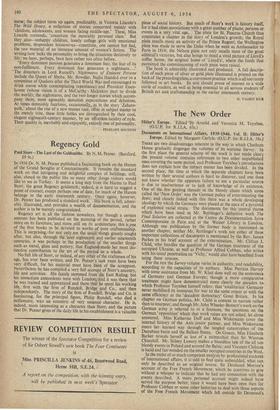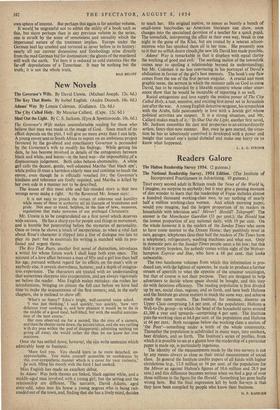The New Order
Hitler's Europe. Edited by Arnold and Veronica M. Toynbee. (O.U.P. for R.I.I.A. 63s.) Documents on International Affairs, 1939-1946. Vol. II: Hitler's Europe. Edited by Margaret Carlyle. (O.U.P. for R.I.I.A. 38s.) THERE are two disadvantages inherent in the way in which Chatham House gradually disgorges the volumes of its wartime Survey. In the first place the general scheme of the work is not made clear; the present volume contains references to two other unpublished ones covering the same period, and Professor Toynbee's introduction does not explain how the subject matter has been divided. In the second place, the time at which the separate chapters have been written by their several authors is hard to discover, and one does not know whether the apparent failure to use a particular source
is due to inadvertence or to lack of knowledge of its existence. One of the few guiding threads in the bloody chaos which some called the 'New Order' was the German policy of exterminating the Jews; and closely linked with this there was a whole developing ideology by which the Germans were placed at the apex of a pyramid of exploited racial strata. The documents for this central theme
which have been used in Mr. Reitlinger's definitive work The Final Solution are collected at the Centre de Documentation Juive
Contemporaine in Paris and at the Weiner Library in London.
Although one publication by the former body is mentioned in another chapter, neither Mr. Reitlinger's work nor either of these important collections of documents is mentioned by the Rev. James Parkes in his brief account of the extermination. Mr. Clifton J. Child, who handles the question of the German treatment of the occupied Ukraine, as well as Professor Alfred Cobban, who writes with his usual penetration on 'Vichy,' would also have benefited from using these sources.
For the rest the Survey volume varies in authority, and readability, according to the capacities of its authors. Miss Patricia Harvey
with some assistance from Mr. W. Klatt does well on the economics of Germany and German Europe; though a more comparative treatment might have demonstrated more clearly the paradox to which Professor Toynbee himself refers: that 'totalitarian' Germany never mobilised its resources for war to the same extent or with the same efficiency as the 'decadent democracy' Great Britain. In his chapter on German politics, Mr. Child is content to narrate rather than to interpret; and though Mr. John Wheeler-Bennett's work on the German army is referred to in a footnote," the questions on the German ' opposition' which that work raises are not asked, let alone answered. Miss Katherine Duff and Miss Wiskemann cover the internal history of the Axis junior partner, and Miss Wiskemann
steers her learned way through the tangled catastrophes of the Danubian basin and the Balkan States. On Greece, Miss Elizabeth Barker reveals herself as less of a monarchist than Sir Winston
Churchill. Mr. Sidney Lowery makes a bloodless tale of the all too bloody events in Poland and around the Baltic; and Viscount Chilston is lucid and fair-minded on the smaller occupied countries in the West.
In the midst of so much competent analysis by professional students of international affairs, it is odd to find quite unheralded, what can only be described as an original source, Sir Desmond Morton's account of the Free French Movement, which he contrives to give without a whisper to indicate that he had any connection with the events described. A more personal account might indeed have served the purpose better, since it would have been open then for Professor Cobban or some other historian to deal with those aspects of the Free French Movement which fell outside Sir Desmond's
own sphere of interest. But perhaps this again is for another volume.
It would be ungrateful not to admit the utility of a book such as this, but more perhaps than in any previous volume in the series, one is struck by the sense of remoteness and unreality which the impersonal nature of the treatment implies. Europe under the German heel lay crushed and tortured as never before in its history: nearly all our current dissensions and forebodings arise directly from the mad German bid for domination; the ghosts of the murdered still walk the earth. Yet here it is reduced to cold statistics like the far-off depredations of a Tamerlane. It may be nothing but the truth; it is not the whole truth.
MAX BELOFF



































 Previous page
Previous page